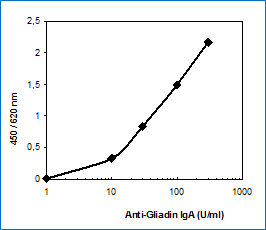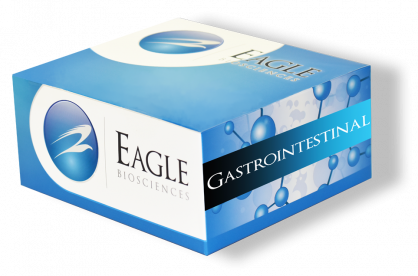Gliadin IgA ELISA Kit
Gliadin IgA ELISA Kit Developed and Manufactured by Medipan
Size: 1×96 wells
Sensitivity: 1 U/ml
Dynamic Range: 1 – 300 U/ml
Incubation Time: 2 hours
Sample Type: Serum, Plasma
Sample Size: 10 µL
Alternative Names: GliaDea IgA ELISA, Human Gliadin IgA ELISA
For Research Use Only
Controls Included
Reference Values
Quantitative (U/ml): Negative < 10, Positive > 15, Grey Zone 10-15
Semi-quant. BI: Negative < 1.0, Positive > 1.5, Grey Zone 1.0-1.5
Specimens with concentrations detected in the grey zone should be tested again.
It is recommended that each laboratory establishes its own normal and pathological reference ranges for serum anti-deamidated gliadin IgA levels, as usually done for other diagnostic parameters, too. Therefore, the above mentioned reference values only provide a guide to values which might be expected.
Assay Background
Celiac disease (CD, sprue, gluten enteropathy) is an intolerance to gluten, a cereal protein present primarily in wheat. This gluten-induced enteropathy leads to a severe damage of the small intestine and a so-called “flat” mucosa. Due to this extensive lesions mal-absorption occurs accompanied with a depletion of key nutrients.
Gliadin the alcohol soluble fraction of gluten represents the causative agent of celiac disease. During resorption gliadin is deamidated by tissue transglutaminas (tTG). Linked to specific genetic predisposition parts of this deamidated gliadin activate HLA-DQ2 and -DQ8 antigen presenting cells. These provoke an inflammatory process in the small intestine triggering both cellular and humoral immune responses. Hence pathogenic Tissue damage as well as production of antibodies against deamidated gliadin and tTG occurs.
Celiac disease is one of the most common enteropathies found in infants, showing first symptoms already at the age between sixth and eighteen months. Incidence rates for celiac disease range from 1 in 300 (Western Ireland) to 1 in 4700 in European countries. However, a high number of subclinical cases of celiac disease have been detected by in-vitro tests revealing a prevalence of 4 in 1000. Individuals suffering from prolonged celiac disease additionally face an elevated risk of developing T cell lymphoma.



